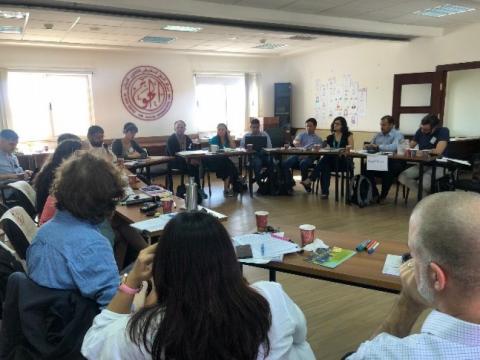
Evolving strategies to overcome corporate capture
Twenty ESCR-Net members came together in Ramallah, Palestine from 11 – 15 November 2019 to discuss collective strategies to overcome corporate capture for the coming two years.
The meeting, which was co-hosted by Al-Haq in partnership with Adalah, gathered diverse corporate accountability advocates and activists, who were joined by several members of ESCR-Net’s Monitoring Working Group and the Task Force for network-wide campaigning. Together, participants forged collective strategies to overcome corporate capture, understood as undue influence by an economic elite over decision-makers and public institutions.
The strategy meeting was organized by the Corporate Capture Project Advisory Group which includes members of the network’s Corporate Accountability Working Group: Al-Haq (Palestine), the Natural Resource Women Platform (Liberia), Comité Ambiental en Defensa de la Vida (Colombia), Corporate Accountability (United States), Above Ground (Canada), Citizen News Service (India), the Sierra Leone Network on the Right to Food (Sierra Leone) and PODER (Mexico).
The meeting began considering cases of corporate capture in various countries, including in contexts affected by conflict and occupation. Participants learned of experiences from El Salvador (shared by El Movimiento Unificado Francisco Sanchez (MUFRAS 1932) and attempts to monopolize the government and decisions about land-use, particularly by the extractive sector. A case involving corporate capture in the occupied Syrian Golan was presented by a representative from Al-Marsad. From Guatemala, a representative from Consejo de Pueblos Wuhxtaj described collusion between the government and mining companies particularly via community manipulation, specifically, by the provision of false information and criminalization of community leaders. Examples of corporate capture in Thailand, in the context of extractive industries and large dam construction were also shared by a representative from Manushya Foundation.
Aiming to widen our common understanding of the power dynamics between the different actors in cases of corporate capture and develop strategies to shift these dynamics, participants then engaged in a power mapping of actors involved in corporate capture.
During the strategy meeting, Al-Haq organized a “business and human rights” tour, illustrating how companies have taken over some of the best resourced areas of the occupied Palestinian territory, with the financial and administrative support of the Israeli government. The case of Ahava, a cosmetic company with the sole license to extract minerals from the Dead Sea in occupied Palestinian territory for products across the world, served as a stark example of company involvement in the Israeli settlement enterprise that includes both residential, industrial and agricultural settlements – all of which are unlawful under international law. You can view a virtual visit of Ahava here. The group also visited a Bedouin Palestinian community in Al-Oja village that is facing attacks from Israeli settlers and businesses that are unlawfully positioned within the premises of their community, forcing the enclosure of lands and water deposits.
The cases and power mapping served to inform the collective articulation of strategies and joint actions necessary to overcome corporate capture at different levels. Discussions emphasized the need for platforms of mutual learning and sharing analysis and highlighted that to strengthen solidarity, collective action on corporate capture must continue to be targeted and organized. Opportunities to strengthen organized work on specific advocacy or campaign targets was also identified.
Goals identified during the strategy meeting included:
- Partner with communities and social movements to meaningfully challenge at least one instance of corporate capture in each region;
- Popularize member-led accessible tools to reinforce a campaign on corporate capture as a concept that moves beyond corruption and into a dangerous reality where public services are privatized, corporations dictate policy, and the economic elite control legislative, executive and juridical mechanisms;
- Identify and engage key global and regional strategic targets as a network; and
- Connect with and contribute to network-wide work to advance community-centred economic alternatives.
These goals continue to be discussed by the Project Advisory Group to finalize a two-year project plan on corporate capture that will also list strategies and tactics that would respond to the goals mentioned previously.
On the final day of the meeting, participants considered the potential for a network-wide campaign involving ESCR-Net’s broad membership, which would focus on corporate capture and land rights. Among other plans, looking ahead to 2020 members are considering deepening ongoing awareness-raising about corporate capture, via accessible materials to support national-level campaigns and cross-regional learning. Meanwhile, members continue to consider other campaign plans, potentially including a coordinated day of action, ongoing research via case studies and new communications materials, among other emerging proposals.
Please contact Mona Sabella at: msabella@escr-net.org for more information about ESCR-Net’s project on Corporate Capture.
